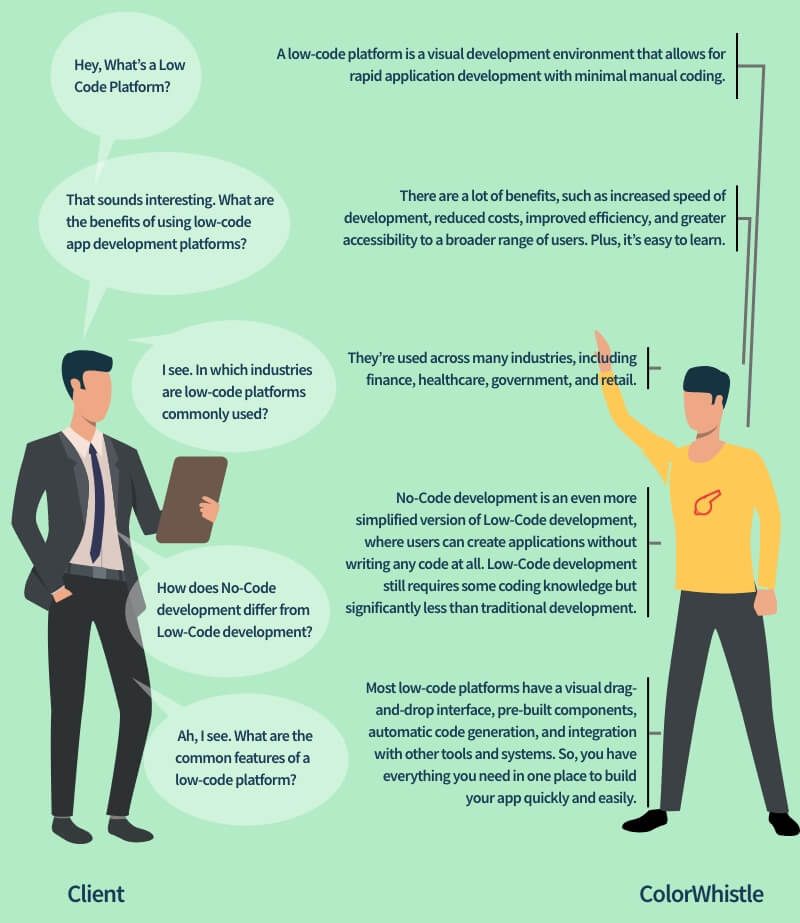FAQs on Low-Code development can be an eye-opener for you to get answers for your what, why, when, and how-type questions.
Are you planning for a Low-Code development for your business?
Are you a B2B partner looking to collaborate with a website development agency?
Are you a business person looking to enhance your current website?
No matter who you are, these FAQs on the Low-Code development blog can serve you with crisp & clear answers!
In this blog, ColorWhistle will be addressing some of the most frequently asked questions about low-code development to help clear up any confusion in choosing the right platform for your business. Whether you’re just starting out or looking to improve your existing strategy, our FAQs on low-code development blog can be a guide for your process so keep reading!
Is it possible to integrate low-code apps with other systems and technologies?
Yes, it is possible to integrate low-code apps with other systems and technologies. Low-code platforms often provide APIs, integrations, and connectors to connect to other systems, databases, and technologies. This allows for the exchange of data and functionality between the low-code app and other methods.
However, the integration capabilities can vary between low-code development platforms and the systems or technologies being integrated.

What are some popular low-code development platforms?
Some popular low-code development platforms that are widely used,
- Salesforce Lightning Platform
- Webflow
- WordPress
- Elementor Cloud
- Microsoft Power Apps
- Appian
- Airtable
- OutSystems
- Mendix
- Softr
- Ghost CMS
- Appy Pie
- Zoho Creator
- QuickBase
- Nintex
- Caspio
- Typeform
These platforms provide visual drag-and-drop interfaces, pre-built templates, and other tools to help developers create custom applications with minimal coding.
How does low-code development compare to traditional coding in terms of cost, speed, and functionality?
Low-code development often promises to reduce the cost and time required to build and launch applications compared to traditional coding methods. However, the level of functionality that can be achieved with low-code platforms is typically more limited than what can be accomplished with custom code.
In terms of cost, low-code platforms can be more cost-effective for small, simple projects, but for more complex projects that require custom functionality, traditional coding may end up being more cost-effective in the long run. It really depends on the specific requirements of the project.
Can you walk me through the low-code development process, from idea to launch?
The low-code development process varies from platform to platform as it is essential to understand and analyze all that a platform offers before implementing it.
Also Read
What is the cost of your services?
The pricing of ColorWhistle’s services is tailored to the unique needs and objectives of each project. We do not offer a one-size-fits-all price as it may not accurately reflect the project’s requirements. When it comes to the low-code development process our
Charges are on top of the low-code platform provider.
To receive a customized quote, kindly share more details about the project’s scope and objectives with us on our request a quote page.
How do you ensure the security and reliability of low-code development?
It is a must ask question for any agency using low-code development. The security of a low-code platform completely depends on various factors, including the specific platform and how it is configured, deployed, and used.
In general, low-code platforms are capable of providing a high level of security when implemented and used properly. However, like any software system, low-code platforms can also have vulnerabilities if they are not properly secured.
It is important to choose a low-code platform that has in-built robust security features and that undergoes regular security audits. Additionally, it is necessary to follow best practices for secure application development and deployment when using a low-code platform. Regular monitoring and maintenance can also help ensure the continued security of low-code apps.
Can low-code apps be easily modified and updated as my business needs change?
When it comes to low-code apps, it’s essential to consider their flexibility for future updates. For example, if an application has been developed for booking meeting rooms using a low-code platform, the application should be able to add new features like booking equipment or food with ease.
The platform should make it simple to update and extend your app as your needs change, without any hassle. The right low-code platform will make it easy to expand and grow your app over time.
Could you explain your team’s structure? Who will handle my project?
Our team is flexible and adaptable to meet the needs of each project. We have a diverse group of experts with various skill sets, and we carefully assemble the ideal team for each project based on specific requirements. This approach ensures that we offer top-notch services to our clients and deliver high-quality work that meets their expectations.
Is it a good idea to use Low-Code development platforms?
Being a digital agency, we believe that the use of low-code app development platforms can bring certain significant benefits to our clients. The speed and efficiency of development, combined with reduced costs and improved collaboration, make low-code platforms an attractive option for many organizations.
It is also to be mentioned that low-code platforms may not be suitable for every project. For example, highly complex applications may require a more traditional, custom-coded approach. Our team works closely to assess the specific needs of the clients and recommend the best and most tailored solution for their project, whether it involves low-code app development or a more traditional approach.
How are the charges for these platforms determined?
When it comes to low-code development, the cost typically depends on the features you require. Some basic plans may be free or low-cost, but if you’re looking for more advanced features, you might be looking at spending hundreds or even thousands of dollars each month. For big businesses, there are enterprise plans that offer lots of users and top-notch features – these plans might be priced based on how many people will use it or how much data needs to be processed.
Is it possible to create complex enterprise-level applications without manual coding?
Yes, it is possible to create complex enterprise-level applications without manual coding through the use of low-code development platforms. But, the end result is quite unpredictable as at times you may not get the expected results as in traditional coding.
However, it is important to note that not all low-code platforms are capable of creating all types of complex applications, and some custom coding may still be necessary in some cases.
Can business users utilize the platform to build applications or is it necessary to have professional developers?
Business owners can build simple applications on low-code platforms without the need for professional developers, but the complexity of the application and the required customization determines the level of technical expertise needed to build it. There are low-code platforms that may require professional developer support for more complex applications.
How flexible is the platform in terms of customization?
The flexibility of a low-code development depends on the specific platform and its capabilities, but generally, they are capable of varying levels of customization through custom code, scripting, pre-built components, or templates.
How is user access control managed on the platform?
It’s a good idea to ask about user access controls, especially if you are considering limiting access to certain features based on user privileges. Also, enquire about implementing two-factor authentication if that’s something you have in mind.
Also Read
What type of customer support is offered?
Make sure that the agency is capable of providing necessary information and support whenever your business needs it. Also, ensure the type of support their offer and the mode they use for communication.
Does the platform support only the development phase or the entire application life cycle?
A low-code platform supports not just the development phase, but the entire application life cycle, which typically includes design, development, testing, deployment, and maintenance. The platform provides a visual, drag-and-drop interface for designing and building applications, and includes tools for testing, deployment, and ongoing maintenance. Using a low-code development, organizations can speed up the development process, reduce manual coding, and also streamlines the application life cycle.
Collection of other FAQ blogs for more information
Be unrestricted to click the other trendy FAQ writes that suits your needs the best!
What’s Next?
Now that you’ve had the chance to explore our blog, it’s time to take the next step and see what opportunities await!





